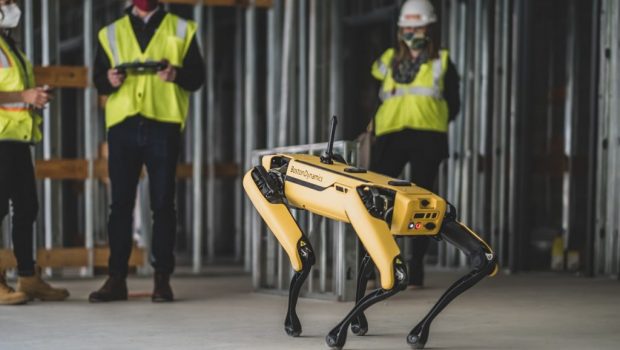Virginia Tech research unleashing robotic technology on campus construction sites | VTx
To automate the data collection process, 2D floor plans are loaded into the app and the operator marks the locations where data will be collected. The operator also records the robot’s navigation paths within the app for future use. The data gathered within the app is analyzed for accuracy and communicated among all project stakeholders.
The unique collaboration among academics, operations, and private industry bringing Spot to Virginia Tech is as innovative as the research itself.
“While we could have conducted this research privately, there are many reasons driving our partnership with Virginia Tech. The university provides strong institutional capabilities in its ability to rigorously study the effectiveness and usability of the technology. Our intention is to develop a long-term collaboration with Virginia Tech to continually investigate emerging technologies and encourage the development of robotics, automation, and information systems standards that improve the interoperability between various architecture, engineering, construction, and operations technology solutions,” said Steve DeVito, director of technology at Procon Consulting.
“Procon’s two cofounders are also proud Virginia Tech alumni. As an organization, we believe strongly in investing in the next generation of construction leaders. Putting emerging technologies like Spot into the hands of students is one way we can help foster the construction talent pipeline for years to come.”
“Teamwork has been a guiding catalyst supporting this study. Procon’s leaders are industry visionaries. After working together on a previous technology-related project about three years ago, I was elated to learn of their interest in introducing the latest robotic technologies onto Virginia Tech construction sites,” said Walid Thabet, professor in the Myers-Lawson School of Construction and co-principal investigator.
“We’ve also been working closely with the Virginia Tech capital construction team for the past six years and are grateful for their continued willingness to open up their job sites to our students and research activities.”
Experts on the capital construction team are working closely with the research team to enable the deployment of legged robots on hazardous and dynamically changing construction sites. Capital construction leaders partnered with Virginia Tech Research and Innovation, Procurement, Risk Management, and Office of Legal Counsel to mitigate operational risks and to establish a legal service agreement for the use of the quadruped robot on live construction sites.
All of these stakeholders also helped the research team to implement standard operating procedures on the construction sites in a way that is safe for both human workers and for the robot.
“We’re thrilled to open up our capital construction sites to help advance Virginia Tech’s educational and research missions. With a host of construction projects underway and planned on the Blacksburg campus and across Virginia, the Division of Campus Planning, Infrastructure, and Facilities is looking forward to more creative partnerships with students, our academic peers, and industry leaders,” said Paul Ely, associate director of capital construction and renovations.
Also, general contractors managing the construction of these projects including W.M. Jordan Company and Branch Builds have been working closely with the research team to investigate autonomous robot navigation and monitor weekly progress on the job sites.








Gloss